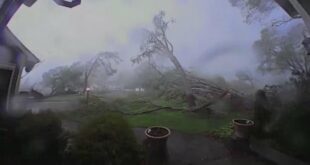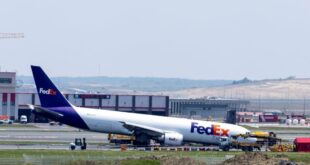Farmers scale back protests after France's government announces new measures

Farmers protest at EU summit for more help with costs, taxes
18 hours ago
Farmers drove their tractors to the European Union headquarters in Brussels, setting fires and throwing eggs, to protest EU agricultural and trade policies they say are threatening their livelihood.
Farmers' protests that began in France in mid-January have spread across Europe in a fight for less bureaucracy and protection of their livelihoods amid the continent's rising cost of living.
The protests caused chaos outside the European Union's headquarters in Brussels on Thursday, where EU leaders were holding a summit. In France, two major farmers' unions later suspended country-wide blockades due to new government measures.
A convoy of farmers driving about 1,300 heavy-duty tractors in Brussels blared horns and snarled traffic to draw attention to their plight. Some set fire to tires and threw stones and eggs, while others warmed themselves on piles of burning wood in the square in front of the European Parliament.
Farmers from Italy, Spain and other European countries joined the demonstration and held protests at home. In Portugal, farmers made their way to the Spanish border at dawn to block some of the roads linking the two countries.
Meanwhile, the growing unrest has also been seen recently in Poland, Greece and Germany.

Portuguese farmers' protest blocks border with Spain
13 hours ago
Portuguese farmers have joined the recent protest movement seen around Europe by using their tractors and machinery to block off a number of roads linking the country to Spain. Farmers on the continent are protesting rising costs, cheap imports and environmental rules.
Why are farmers protesting?
The largest farmers' groups in the EU say environmental regulations imposed by Brussels, and overregulation in general, are undermining the profitability of crops.
Also hurting the bottom line is the high cost of fertilizers and fuel, which has sharply increased since Russia invaded Ukraine two years ago.
Farmers have also denounced what they consider to be unfair foreign competition.

In Poland, disgruntled farmers protested in major cities last month to draw attention to competition from neighbouring Ukraine, which has been granted special wartime export regulations.
EU farmers overall have been struggling to compete in the increasingly globalized economy, with the movement of goods and services supported by several free-trade agreements the EU has signed in recent years.
Offer of financial support
To ease tensions, French Prime Minister Gabriel Attal announced new measures on Thursday that include financial aid and tax breaks for farmers.
The French Finance Ministry said the new emergency measures — focused largely on supporting struggling livestock farmers and wine producers — would cost 400 million euros ($581 million Cdn) plus 200 million euros in cash advances.
In his speech, Attal said it was "out of the question" that France would agree to a trade deal with South America's Mercosur trading bloc, consisting of Argentina, Brazil, Paraguay, and Uruguay — countries that use growth hormones, antibiotics and pesticides not allowed in the European Union.
Attal, sworn in as prime minister in early January, said France will step up safety checks on food imports, notably to make sure imported foods do not have traces of pesticides that are banned in France or the EU.
Frustrated farmers descend on EU summit, hurl eggs
16 hours ago
Farmers from several European countries descended on Brussels to demand action from EU leaders on pay, taxes, green regulations and competition.
Attal also said the government will stop imposing stricter regulation on its farmers than European Union regulations require.
"It makes no sense to ban pesticides in France before such decisions are taken on an EU level. We will end this practice," he said.
Leaders of two key unions said after the speech that their call to end the roadblocks came with the condition that the promises be followed by concrete progress.

They said they would give the government a three-week deadline until the start of the Paris International Agricultural Show, France's giant farming trade fair, for the first results to show.
It was unclear if all of the farmers on France's streets followed the guidance given by the two main unions. Many farmers are not union members.
Union leader seeing 'tangible progress'
France's two major farmers' unions announced they would lift country-wide blockades, shortly after the prime minister introduced the new measures.
However, farmer activists who have snarled traffic along major highways around Paris said they would stay put at least another day to see the government commitments in writing, and both unions said they would closely monitor any government implementation.
"We don't want to hear words of love. What we want is proof of love," said Thierry Desforges, a farm union member protesting at the road blockade of the A6 highway in Chilly-Mazarin, south of Paris.
Arnaud Rousseau, president of France's biggest farmers' union, FNSEA, and Young Farmers union president Arnaud Gaillot said Thursday that they were calling on their members to suspend the protests.
"We have been heard on a number of points, with tangible progress," Rousseau said, although both unions said they would give keep a close eye on whether the government implements its promises by June.
Elsewhere in the EU
On Wednesday, the European Commission proposed to limit agricultural imports from Ukraine by introducing an "emergency brake" for the most sensitive products — poultry, eggs and sugar — but producers say the volume would still be too high.
Farmers have also taken issue with new EU subsidy rules, such as a requirement to leave four per cent of farmland fallow.
The commission this week responded by exempting EU farmers this year from the requirement to keep some of their land fallow — not using it for a period of time — while still receiving EU farm support payments, but they would need to instead grow crops without applying pesticides.
With files from CBC News and Reuters
*****
Credit belongs to : www.cbc.ca
 MaharlikaNews | Canada Leading Online Filipino Newspaper Portal The No. 1 most engaged information website for Filipino – Canadian in Canada. MaharlikaNews.com received almost a quarter a million visitors in 2020.
MaharlikaNews | Canada Leading Online Filipino Newspaper Portal The No. 1 most engaged information website for Filipino – Canadian in Canada. MaharlikaNews.com received almost a quarter a million visitors in 2020.







